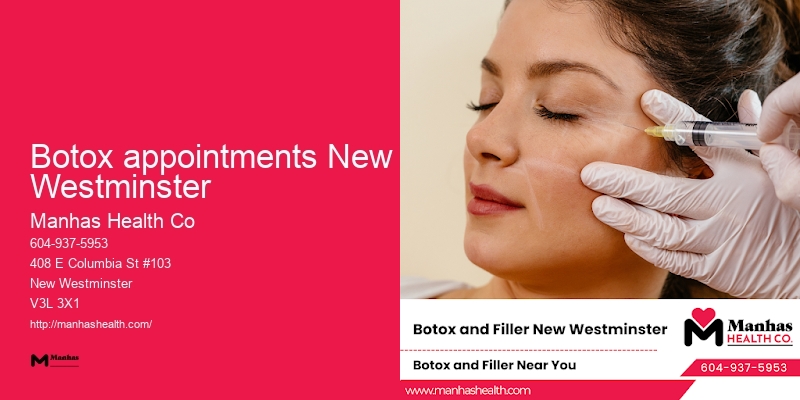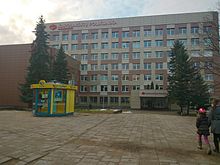

We've incorporated a gentle skincare routine, avoiding harsh products or exfoliants for the first few days. When considering Botox treatments, it's crucial to understand their safety profile and effectiveness, ensuring you're making a well-informed decision. Learn more about Botox appointments New Westminster here Lastly, we pride ourselves on our exceptional customer service. By incorporating these treatments into your care routine, we're not just turning back the clock; we're slowing its ticking, ensuring that your skin remains vibrant and youthful for as long as possible.
Why should you let wrinkles define your age when Botox can help turn back the clock with its remarkable ability to smooth out fine lines? Botox For Under Eye Bags Wrinkles, fine lines, and other age indicators seem to fade, giving the skin a smoother, more youthful appearance. Learn more about Manhas Health Co. here. This approach has built us a reputation as a trusted partner in our community's wellness journey.
Continuous learning and professional development are encouraged, ensuring that our clients receive the best possible care. While discussing the benefits of Botox, it's crucial to address the safety and potential side effects associated with the treatment. We've also heard worries about the discomfort associated with Botox injections. Botox Aesthetics Botox For Feet
At Manhas Health Co., we believe that a one-size-fits-all approach doesn't work when it comes to your wellness and aesthetics. We're proud to offer services that not only meet but exceed our clients' expectations, providing results that truly make a difference in their lives. By sticking to these before and after care tips, we're confident you'll love your refreshed look.
Building on our commitment to your satisfaction, we equally prioritize your safety with rigorous standards and personalized care in every cosmetic Botox procedure. These stories aren't just about the aesthetic improvements; they're about the newfound confidence and joy our clients experience. First, it's essential to avoid alcohol for at least 24 hours before your session. At Manhas Health Co., we recognize that every person's skin and aesthetic goals are unique.
The entrance to the Fraser is very striking—Extending miles to the right & left are low marsh lands (apparently of very rich qualities) & yet fr [sic] the Background of Superb Mountains—Swiss in outline, dark in woods, grandly towering into the clouds there is a sublimity that deeply impresses you. Everything is large and magnificent, worthy of the entrance to the Queen of England's dominions on the Pacific mainland. My imagination converted the silent marshes into Cuyp-like pictures of horses and cattle lazily fattening in rich meadows in a glowing sunset. The water of the deep clear Frazer was of a glassy stillness, not a ripple before us, except when a fish rose to the surface or broods of wild ducks fluttered away.
We understand that choosing the right provider is crucial, and we're here to ensure you receive the best possible experience and results. Botox For Underarm Sweating We're committed to ongoing education and training, ensuring we're always up-to-date with the latest techniques and advancements in the field.


We've seen firsthand how this mechanism can smooth out fine lines and give our clients a more youthful look. Your safety and satisfaction are our top priorities, ensuring you can enjoy your rejuvenated appearance with peace of mind.
If you're on any prescription blood thinners, please consult with us or your healthcare provider before making any changes. Trust us to be your partners in beauty, offering expert advice and unparalleled care throughout your journey. When we inject Botox into specific muscles, it binds to the nerve endings, stopping the release of acetylcholine, a neurotransmitter responsible for muscle movement. Transparency is key to our safety approach.
Initially, we'll have a consultation to discuss your concerns and desired outcomes. We'll discuss all costs and payment options with you in detail, ensuring there are no surprises.


We always emphasize the importance of consulting with our specialists before deciding on Botox. Choosing Manhas Health Co means opting for excellence, care, and value. At the heart of Manhas Health Co's success is our expert team, whose dedication and skill are unmatched in the industry. This commitment to quality means you'll see better, longer-lasting results.
Whether you're looking to soften the appearance of fine lines, reduce forehead wrinkles, or achieve a more refreshed look, we tailor each treatment to your specific desires and skin type. Most clients report feeling only a slight pinch. Best Botox Clinics In New Westminster When considering cosmetic Botox at Manhas Health Co, it's vital to know what the journey entails from start to finish.
After your treatment, we'll provide comprehensive aftercare instructions and support.

Cosmetic may refer to:

A clinic (or outpatient clinic or ambulatory care clinic) is a health facility that is primarily focused on the care of outpatients. Clinics can be privately operated or publicly managed and funded. They typically cover the primary care needs of populations in local communities, in contrast to larger hospitals which offer more specialized treatments and admit inpatients for overnight stays.
Most commonly, the English word clinic refers to a general practice, run by one or more general practitioners offering small therapeutic treatments, but it can also mean a specialist clinic. Some clinics retain the name "clinic" even while growing into institutions as large as major hospitals or becoming associated with a hospital or medical school.

The word clinic derives from Ancient Greek κλίνειν klinein meaning to slope, lean or recline. Hence κλίνη klinē is a couch or bed and κλινικός klinikos is a physician who visits his patients in their beds.[1] In Latin, this became clīnicus.[2][3]
An early use of the word clinic was "one who receives baptism on a sick bed".[4]

Clinics are often associated with a general medical practice run by one or several general practitioners. Other types of clinics are run by the type of specialist associated with that type: physical therapy clinics by physiotherapists and psychology clinics by clinical psychologists, and so on for each health profession. (This can even hold true for certain services outside the medical field: for example, legal clinics are run by lawyers.)
Some clinics are operated in-house by employers, government organizations, or hospitals, and some clinical services are outsourced to private corporations which specialize in providing health services. In China, for example, owners of such clinics do not have formal medical education. There were 659,596 village clinics in China in 2011.[5]
Health care in India, China, Russia and Africa is provided to those regions' vast rural areas by mobile health clinics or roadside dispensaries, some of which integrate traditional medicine. In India these traditional clinics provide ayurvedic medicine and unani herbal medical practice. In each of these countries, traditional medicine tends to be a hereditary practice.

The function of clinics differs from country to country. For instance, a local general practice run by a single general practitioner provides primary health care and is usually run as a for-profit business by the owner, whereas a government-run specialist clinic may provide subsidized or specialized[dubious – discuss] health care.
Some clinics serve as a place for people with injuries or illnesses to be seen by a triage nurse or other health worker. In these clinics, the injury or illness may not be serious enough to require a visit to an emergency room (ER), but the person can be transferred to one if needed.
Treatment at these clinics is often less expensive than it would be at a casualty department. Also, unlike an ER these clinics are often not open on a 24/7/365 basis. They sometimes have access to diagnostic equipment such as X-ray machines, especially if the clinic is part of a larger facility. Doctors at such clinics can often refer patients to specialists if the need arises.[6]

Large outpatient clinics vary in size, but can be as large as hospitals.
Typical large outpatient clinics house general medical practitioners (GPs) such as doctors and nurses to provide ambulatory care and some acute care services but lack the major surgical and pre- and post-operative care facilities commonly associated with hospitals.

Besides GPs, if a clinic is a polyclinic, it can house outpatient departments of some medical specialties, such as gynecology, dermatology, ophthalmology, otolaryngology, neurology, pulmonology, cardiology, and endocrinology. In some university cities, polyclinics contain outpatient departments for the entire teaching hospital in one building.

Large outpatient clinics are a common type of healthcare facility in many countries, including France, Germany (long tradition), Switzerland, and most of the countries of Central and Eastern Europe (often using a mixed Soviet-German model), as well as in former Soviet republics such as Russia and Ukraine;[7] and in many countries across Asia and Africa.[8]
In Europe, especially in the Central and Eastern Europe, bigger outpatient health centers, commonly in cities and towns, are called policlinics (derived from the word polis, not from poly-).
Recent[when?] Russian governments have attempted to replace the policlinic model introduced during Soviet times with a more western model. However, this has failed.[9]
In the Czech Republic, many policlinics were privatized or leasehold and decentralized in the post-communist era: some of them are just lessors and coordinators of a healthcare provided by private doctor's offices in the policlinic building.[10]
India has also set up huge numbers of polyclinics for former defense personnel. The network envisages 426 polyclinics in 343 districts of the country which will benefit about 33 lakh (3.3 million) ex-servicemen residing in remote and far-flung areas.[11]
Policlinics are also the backbone of Cuba's primary care system and have been credited with a role in improving that nation's health indicators.[12]


Providing health services through mobile clinics provides accessible healthcare services to these remote areas that have yet to make their way in the politicized space. For example, mobile clinics have proved helpful in dealing with new settlement patterns in Costa Rica. Before foreign aid organizations or the state government became involved in healthcare, Costa Rica's people managed their own health maintenance and protection.[13] People relied on various socio-cultural adaptations and remedies to prevent illnesses, such as personal hygiene and settlement patterns.[13] When new settlements that sprang up along the coast became "artificial" communities, and due to lack of traditional home healing practices here, alternative methods such as mobile clinics had to be implemented in these communities for the protection and prevention of diseases.[13]
A study done in rural Namibia revealed the health changes of orphans, vulnerable children and non-vulnerable children (OVC) visiting a mobile clinic where health facilities are far from the remote villages.[14] Over 6 months, information on immunization status, diagnosis of anemia, skin and intestinal disorders, nutrition, dental disorders was collected and showed that visits to mobile clinics improved the overall health of children that visited regularly. It concluded that specified "planning of these programs in areas with similarly identified barriers may help correct the health disparities among Namibian OVC and could be a first step in improving child morbidity and mortality in difficult-to-reach rural areas."[14]

Food supplementation in the context of routine mobile clinic visits also shows to have improved the nutritional status of children, and it needs further exploration as a way to reduce childhood malnutrition in resource-scarce areas. A cross-sectional study focussed on comparing acute and chronic undernutrition rates prior to and after a food-supplementation program as an adjunct to routine health care for children of migrant workers residing in rural communities in the Dominican Republic.[15] Rates of chronic undernutrition decreased from 33% to 18% after the initiation of the food-supplementation program and shows that the community members attending the mobile clinics are not just passively receiving the information but are incorporating it and helping keep their children nourished.[15]

There are many different types of clinics providing outpatient services. Such clinics may be public (government-funded) or private medical practices.
cite book: |website= ignored (help)
We're wondering if there are unique Botox formulations offered exclusively by this provider that you can't find anywhere else. It's intriguing to think about the potential benefits of such proprietary treatments in enhancing beauty.
We're wondering if we need to follow any specific diet or lifestyle changes before or after getting Botox treatments. It's important for us to know how to prepare and maintain the best results possible.
We're curious about the qualifications and experience of the professionals who'll be administering our Botox treatments. It's crucial for us to know they're highly skilled to ensure we're making a safe choice.